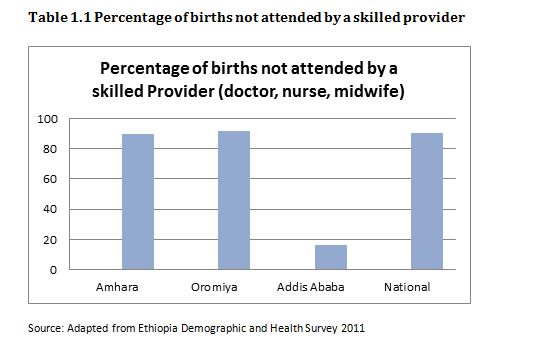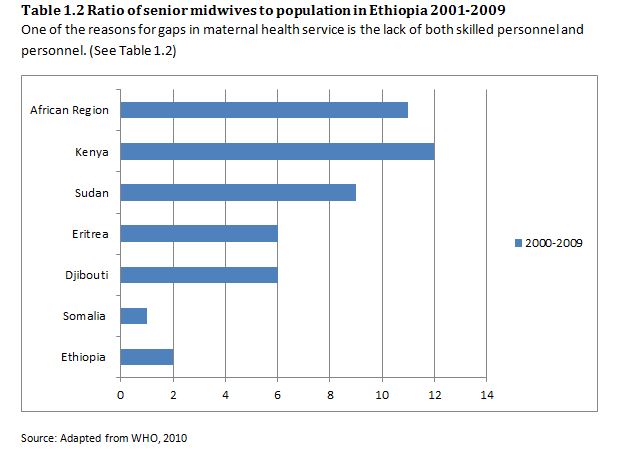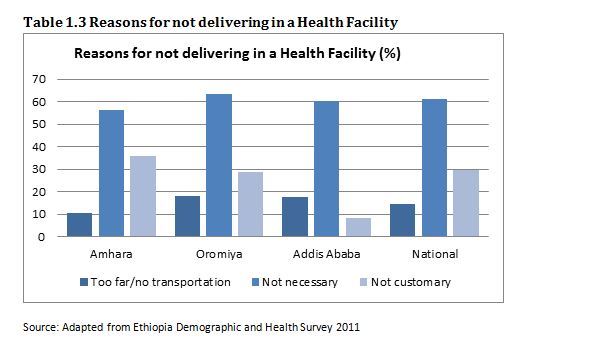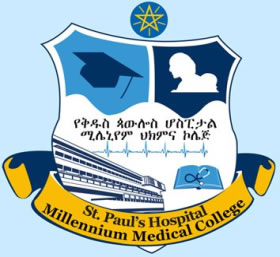Maternal and Newborn Child Health Ethiopia

Ethiopia-Canada Maternal Child Health Project (ET-MNCH)
Saving Lives by improving Birth Attendance and Referral Procedures
Working with key partners in Ethiopia and Canada, a team from the University of Alberta's Faculty of Medicine and Dentistry led a 5 year project from 2012-2018 to reduce maternal and child mortality in this East African country. The project, financed by the Canadian government's Department of Foreign Affairs, Trade and Development, had as its focus to help experienced midwives become better at passing on their skills to newer colleagues, and enhance the country's capacity to effectively treat labouring mothers and their children when complications arise.
Our Objectives
The overarching goal of our project was to help Ethiopia in its drive to meet Millennium Development Goals by lowering high rates of maternal and perinatal mortality and morbidity.
We hoped to achieve that by:
- Increasing access to skilled birth attendants and boosting the number of expectant mothers who take advantage of their expertise.
- Increasing maternal and neonatal skills and experience of midwives, health officers and other personnel.
- Improving the teaching of midwifery at national and regional midwifery schools.
- Increasing the awareness that families, communities and health workers have of available MNCH services.
- Enhancing the capacity of stakeholder organizations to sustain equitable and gender sensitive MNCH systems.
- Enhancing the capacity to track and monitor maternal and newborn well-being at primary levels, referral centres and health education institutions.
We aimed to improve outcomes in emergency cases by:
- Increasing the coordination and use of an improved referral system.
- Improving basic and comprehensive emergency obstetric care offered at all levels of service.
- Increasing awareness of the value of referral in emergency birth situations among community members, including leaders, expectant mothers and family members.
Improving Childbirth Outcomes in Ethiopia
Saving Lives of Mothers and Newborns by improving Birth Attendance and Referral Procedures

A key goal is reducing under-5 mortality by two-thirds
As many as 25,000 women in Ethiopia die in childbirth each year, and almost three times that many new newborns do not survive the first 28 days of life. Our collaboration of Canadian and Ethiopian colleagues was to help reduce this appalling, medically unnecessary toll by building up the clinical and teaching skills in the country's rapidly expanding corps of midwifery instructors, and by targeting gaps in the referral system for difficult childbirth cases.
The project, which was launched in 2013 and began the first of four annual Senior Midwife Tutor courses in Addis Ababa in February 2014, was based at the University of Alberta in Edmonton, Canada and at St. Paul's Hospital Millennium Medical College (SPHMMC) in the Ethiopian capital. It was funded by the Canadian government through the Department of Foreign Affairs, Trade and Development, with large in-kind contributions from the Canadian partners.
The goal was to reduce maternal and perinatal mortality and morbidity in Ethiopia by expanding the reach and reliability of basic services and techniques that Canadians have long taken for granted. This Horn-of-Africa country has some of the worst MNCH (maternal-newborn-child-health) statistics in the world, with a maternal-mortality rate of 676 per 100 000 live births, a perinatal mortality rate of 85 per 1000 live births and an under-5 mortality of 104 per 1000 live births.
Of course, Ethiopia is already working flat out on a variety of fronts to achieve related Millennium Development Goals by 2015. This project was developed to support that drive, especially on MDG4 (reducing under 5 child mortality by two-thirds) and MDG5 (reducing maternal mortality by three quarters.) But huge challenges remain.
Maternal-mortality trends particularly affect women in rural and remote communities. In Ethiopia only 10 per cent of women give birth in health facilities, though great strides are being made to deal with this by both the government and NGOs. A large factor contributing to this problem is the shortage of midwives and skilled birth attendants. Our project addressed these needs by focusing on three key areas:
- Increasing the availability, access to and use of skilled birth attendants across the country;
- Increasing access to and use of higher levels of expertise and hospital infrastructure for emergency births; and
- Enhancing institutional environments to support sustainable, equitable and gender sensitive maternal, neonatal and child health services.
We began work in 2012, consulting in depth with local partners and creating wide networks of government, health and local leaders to determine baseline needs. From there we began developing a curriculum for "train-the-trainers" courses to cascade improved midwifery skills out into the country.
The midwifery component - the Senior Midwife Tutor Training Program, or SMTTP - was national in scope while the referral wing focuses on our catchment areas in parts of Addis Ababa, Amhara and Oromiya regions.
Our two partners in Ethiopia included SPHMMC and the Ethiopian Ministry of Health. Our major collaborators in country included the Ethiopian Midwives Association (EMA), the African Medical and Research Foundation, the Ethiopian Public Health Association (EPHA) and Addis Ababa University. Associated organizations include UNFPA, WHO, UNICEF, CARE, and the Hamlin Fistula Hospital (and Midwifery Program).
Leading the list of key Canadian partners was Mount Royal University of Calgary, home of Alberta's only degree program in midwifery and the key source of instructors for our annual SMTTP courses.
While the main project targeted midwifery skills and birth referral systems, the project also provided a complementary strengthening of frontline caregiving, developing relevant competencies at St. Paul's Hospital (recently designated as a national referral center for Maternal and Child Health) and strengthening the EMA.
Project undertaken with the financial support of the Government of Canada

Maternal Mortality in Ethiopia
In 2011, according to the Ethiopian Demographic and Health Survey, the maternal mortality rate in Ethiopia was 676/100,000 live births compared to only 12/100,000 live births in Canada. The majority of pregnant women affected are those living in rural areas who do not have access to skilled birth attendants or referral systems for socio-economic, cultural or demographic reasons. In Ethiopia 83.6% of the population live in rural areas and 90% of total national births occur in rural areas. Of these births, only 10% of these births are attended by skilled health personnel.

One of the reasons for gaps in maternal health service is the lack of skilled personnel.

Of the women giving birth in the rural areas of Ethiopia, 30% do not seek health care due to cultural beliefs and 60% of pregnant women in rural areas do not feel it is necessary to attend a health facility.

The Government of Ethiopia (GOE) is committed to health sector reforms and recognizes addressing maternal newborn and child health (MNCH) is central to their reform agenda. Various national policies contribute to the welfare of mothers and children, including:
- Health Sector Development Plans (HSDP) since renewed nationhood in 1991, especially HSDP III (2005/06-2010/11) and HSDP IV
- Plan for Accelerated and Sustained Development to End Poverty (specifically includes increasing the proportion of births attended by skilled health personnel)
- National Reproductive Health Policy
- National Population Policy
- National Policy on Women
- National Strategy on Child Survival and
- Making Pregnancy Safer Initiative
This project will provide a complementary contribution to these policies by focusing on educational and clinical strategies to strengthen front line caregiver skills, develop highly skilled midwifery trainers, develop relevant competencies at a relatively newly designated national referral center - St. Paul's Hospital Millennium Medical College (SPHMMC), our operational local partner, and by contributing to strengthening the Ethiopian Midwives Association (EMA) among other relevant organizations in Ethiopia.
The Project will be implemented nationally for the midwifery component and in defined parts of Amhara and Oromiya Regions and Addis Ababa for the referral program. The University of Alberta will work with two Ethiopian partners, St. Paul's Hospital Millennium Medical College and the Federal Ministry of Health.
It will take a whole systems approach to MNCH in Ethiopia, from primary to tertiary levels, from rural communities to urban neighbourhoods, while concentrating on the development of much needed midwifery education and institutional capacity building to assist mothers and children to be healthy prior, during and following birth.
We will lay the foundations for further national education program development and implementation at SPHMMC of essential and highly recommended basic and emergency obstetric and newborn care. Our midwifery training and education programs will contribute to Ethiopia's national strategy of building and accelerating the training of midwives to reach 8635 by 2015. While this type of assistance is being afforded by other organizations, our focus from the community to the national MNCH referral hospital is unique.
Information taken from the Project Implementation Plan 2014
The objective of the referral wing of our project was to improve procedures for handling of both normal and emergency birth situations, and to boost the capacity of health institutions at all levels to support maternal, neonatal and child health services. While the project's work to augment midwifery training in Ethiopia was national in scope, the referral effort focused on Addis Ababa, Fiche (the North Shoa Zone) and areas identified in Amhara and Oromiya regions.
Two of the main contributors to high maternal and infant death rates in Ethiopia are the lack of access to quality health care - both in terms of competent personnel and properly equipped facilities, particularly in rural areas - and poor systems for transferring delivering mothers to higher levels of care when emergencies arise.
We endeavoured to address these problems by focusing our activities on several fronts: 1) Increasing access to and use of skilled birth attendants; 2) Improving the coordination and use of an improved referral system; and 3) Helping organizations and institutions that support maternal and child health services, and in particular the Ethiopian Midwives Association.
Helping Babies Breathe
Helping Babies Breathe (HBB) is a program that teaches the essential skills of caring for healthy babies and assisting newborns who are initially unable to breathe on their own. In 2013, HBB training was our project's first real output, offered at both St. Paul's Hospital Millennium Medical College and Fiche Hospital.
Our goal was to ensure that everyone involved in the delivery and birth process in these facilities was trained in HBB, including doctors, residents and nurses in both the pediatric and obstetric departments. In 2014, further sessions were given in Fiche and to students of our Senior Midwife Tutor Training Program in Addis Ababa. Another was scheduled at St. Paul's in November of that year.
A Quality Improvement Workshop was also slated for St. Paul's in November; it was tailored to support the group responsible for overall implementation of the HBB program in the hospital. The goal of this team was to ensure that in the future, no baby would be born in the hospital without HBB-trained personnel and proper equipment on hand. A similar process was undertaken in Fiche.
Data Collection
As training and needs assessments were completed at all levels of the health system in our catchment areas, essential equipment was purchased where necessary. Staff were hired to support this effort: a data collection officer to work in the obstetrics and pediatric departments at St. Paul's; a field data collection officer to play the same role in the project's other target regions.
Micro Research and Continuing Education
Micro Research training was an important part of our project. As well as being a component of the annual SMTTP course, it was the subject of a separate course - taught by Dalhousie University's MicroResearch team - presented to a multidisciplinary group of 30 participants at SPHMMC in October 2014.
The goal of this initiative was to build capacity for community-based health research. As part of the training, participants worked in groups to identify problems and develop research proposals to investigate their ideas. Funding and mentoring was available for them to assist in collecting data and developing solutions to the challenges they tackled. Five groups from the October course had micro-research proposals on the go.
Recent Activity
In the summer of 2014, the Addis Ababa Project Office team visited Fiche Hospital, two Health Centers and four Health Posts in the area. They met with zonal directors, facility heads, midwives, health extension workers, MNCH department staff and supervisors. They also visited the facilities and considered opportunities for future training, checked out supplies of materials and equipment and reviewed documentation such as registration books and log sheets.
Additionally, a graduate student from University of Saskatchewan worked in the field with our office staff and a data-collection team to assist in setting up our Referral Strategic Plan. They set up preliminary meetings with people involved in emergency referral in our catchment areas and with them reported on improving current procedures.
Contact Us
Project email: ETMNCH@ualberta.ca
Dr. Roger Turnell PhD, MDCM, MEd, FRCSC
Director, GAC (Global Affairs Canada) UAlberta MNCH Ethiopia Project
Professor and Specialist in Maternal Fetal Medicine
Lois Hole Hospital for Women
Faculty of Medicine & Dentistry
University of Alberta at the RAH Site
and
2-115 Edmonton Clinic Health Academy
11405-87 Avenue
Edmonton, Alberta, Canada T6G 1C9
T: 780-735-4812
F: 780-248-1163
Ashton James, B.A.
GAC (Global Affairs Canada) Project Manager
Ethiopia MNCH Project
Division of Community Engagement
Faculty of Medicine & Dentistry
University of Alberta
2-115 Edmonton Clinic Health Academy
11405-87 Avenue
Edmonton, Alberta, Canada T6G 1C9
T: 780-492-8010
F: 780-248-1163
Follow us on Twitter: @ETMNCH
Like us on Facebook: Ethiopia-Canada MnchProject
Project undertaken with the financial support of the Government of Canada


